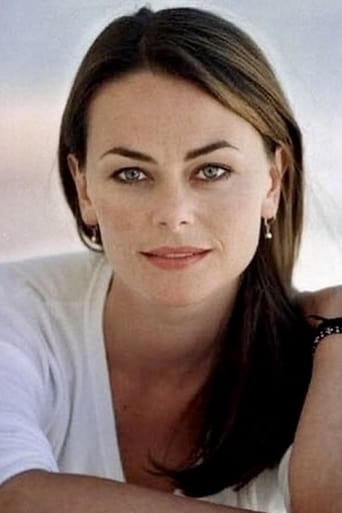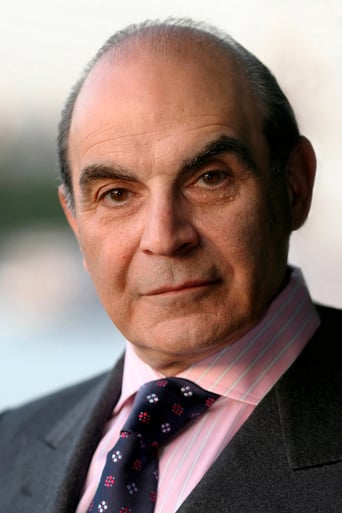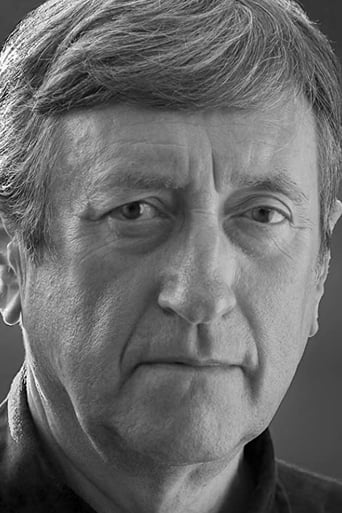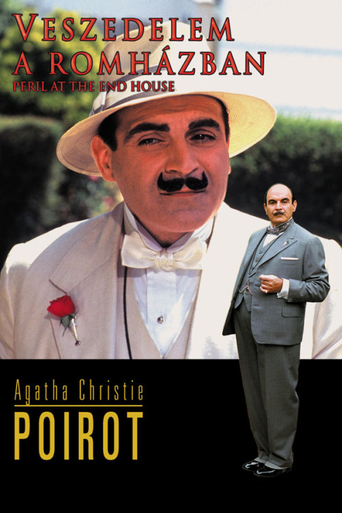
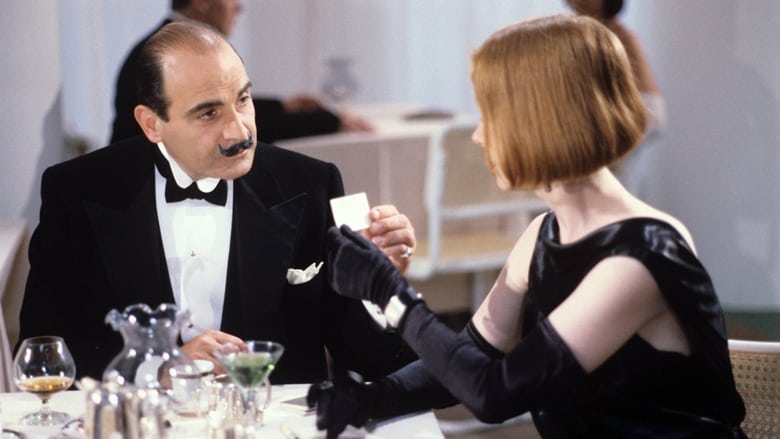
Peril at End House (1990)
Watch Trailer
Cast


Reviews
I had seen this movie about a year ago and vaguely recollected that there was something about it that I didn't enjoy, but upon rewatching I couldn't find anything that bothered me unduly. From the opening moments, when we see Poirot and Hastings in an airplane, Poirot's hand gripping the armrest like a claw, the witty dialogue begins. Hastings compares the view of the landscape and clouds to a patchwork quilt and cotton wool. When Poirot, who is clearly terrified, refuses to play along, Hastings accuses him of having no imagination. "That is true", Poirot says, "but you have enough for both of us." The plot line is clear enough. Poirot and Hastings, on vacation in Cornwall, meet a young lady who has apparently just escaped being killed more than once. When the lady's cousin is mistaken for her and shot in consequence, the lady, Nick Buckley, retreats to a nursing home for her own protection, but the attempts on her life continue. Poirot and Hastings, along with Chief Inspector Japp and Miss Lemon, need to find out who killed Nick's cousin Maggie before Nick herself is killed.The solution to the mystery is clever, but not extraordinary for Christie. What makes the movie charming is a combination of the stunning location shooting and the light-hearted writing. From the Majestic Hotel where the pair are staying, to the grounds of the titular End House, to the shots of the coastline, the episode is a feast for the eyes. And, although some of the best lines are borrowed straight from the original novel (Poirot asks Hastings to tell Nick what a great detective he is. When Hastings responds with a dull description, Poirot says, "Mais dis donc, that I am a detective unique, unsurpassed, the greatest who has ever lived!" Hastings: "Well, there's no need now, you've told her yourself." Poirot: "Yes, but it is agreeable to maintain the modesty.") there are also several scenes written for the screenplay that shine, especially when Poirot assures everyone at the table that Miss Lemon is psychic and she has to suddenly pretend to be a medium and conjure up Miss Buckley's spirit.) Overall an entertaining entry in the Poirot series.
"Poirot" was able to do two things simultaneously. It was able to raise some of Christie's lesser and even awful Poirot stories to a high level; and it was able to make a hash out of some of Christie's best Poirot stories (one of the best mystery novels ever, THE MURDER OF ROGER ACKROYD, was really a disgusting effort of trouncing Christie, worse even than any of the later and less careful treatments of Conan Doyle in Jeremy Brett's "Sherlock Holmes" -- a show that was letter perfect when it started but, like "Poirot", really crashed toward the end).While "Poirot" excelled in dealing with Christie's short stories than her novels occasionally, in some weird synchronicity, Christie's better stories and novels were exceptionally well done by Suchet and crowd.PERIL AT END HOUSE is one of my favorite Christie books. It's a pleasure to meet and mingle with the world-weary post-World War I characters who might have stepped right out of John Monk Saunders THE SINGLE LADY, Hemingway's THE SUN ALSO RISES, or Fitzgerald's GREAT GATSBY. But instead of leading pointless, party lives, Christie livens them up by pitching them right into the middle of a mystery.But this is not your run-of-the-mill Christie. Rather than having a murder at the start and introducing a lot of shady characters with equal motives, this time the mystery is: who is trying to kill the beautiful, but penurious, young owner of End House, Nick Buckley? Poirot is trying to stop a crime before it is committed. But has he arrived on the scene in time to stop a murder? And is there a crime at all, or is it all in Miss Buckley's vivid imagination? Nick's blase best friend, who always seems on the verge of saying "I'll take vanilla", tells Poirot none of it is really happening, that it's all in her mind. After all, why would anyone want to murder a happy young woman with nothing to her name except a heavily-mortgaged old house? The story is crowded with the usual Christiesque suspects (a lawyer cousin who might be next-of-kin; an overly-cheery Aussie couple; a naval officer with no money -- but an expensive yacht; etc.) but this two-part story really belongs to Polly Walker's blithe young owner of a decrepit mansion who has to be persuaded to beware for her life; and to David Suchet, whose Poirot gets off some of his best quips (and facial expressions). Hugh Fraser's Hastings, usually good for a few laughs or for the incisive ordinary person's view, is particularly dim in this episode.So one of Christie's better books becomes one of Suchet's better turns as Poirot. Go figure.
The adaptation is fairly good and mostly faithful to the book, but for some reason the resolution part is way too condensed and unsatisfactory. It leaves many questions unanswered and make them seem like "loop- holes", as some reviewers here called them. The book, however, gives most of the answers to these questions. Some answers make more sense than others, but they're still there, and I feel obliged to at least mention some of them here for those who watched this episode without having read the book.If you haven't watched the episode yet, this article is naturally not for you. SPOILERS START HERE:1) The cousin that was invited upon the insistence of Poirot - This bit has been altered a bit from the actual occurrences and timings mentioned in the book. In the book Nick writes a letter to Maggie after Poirot suggests it, and Maggie arrives a day before the fireworks party. We later learn though that Maggie was supposed to come to End House for the party ANYWAY, and after Poirot's suggestion, Nick's devilish lying mind quickly uses this remark for her benefit. She says she'll arrange for her cousin to come and stay with her, and then goes and writes Maggie asking her to come a day earlier. We learn this when Maggie's parents show Poirot a letter they got from Maggie upon her arrival to End House where she states she still doesn't know why she had to come earlier. This action by Nick goes hand-in-hand with the idea that Nick is liar of big calibre, perhaps a pathological one. She is fast to think of a lie that would benefit her plan perfectly, when opportunity knocks. In the adaptation Maggie gets there the day of the party (if I recall correctly). By the logic of the book, I would assume Maggie was supposed to come to the party anyway, and Nick simply lies to Poirot about her writing to Maggie upon his request, as saying she'll invite Maggie benefits her immensely and make her seem even less guilty and renders the whole murder as a sure-fluke.2) The bullet - Well, there was obviously no bullet shot. I'm not sure the explanation given in the book makes PERFECT sense, but there is still an answer. We have to start with a fact which is not mentioned in the adaptation - Nick knew very well who Hercule Poirot was and he was a part of her plan all the while. It's not by chance that she ends up sitting on that terrace with him. She needs him to watch her little performance. There is already a prearranged hole in the hat when she sits next to Poirot and Hastings (I don't remember exactly how she pulls this one off - but I would assume the hole is in the back of the hat, where it can't really be witnessed). She waits for an opportunity when a plane passes by (or any other thing that would make a noise), gets the used Mauser bullet she conceals in her pocket and throws it behind her while mentioning a bee passing by. She then takes off her hat and put it on the table for Poirot to see the hole. She leaves the terrace, but leave the hat with Poirot. Now, I'm not sure whether Poirot is supposed to be witnessing the bullet fly off as she throws it, or hear the clanking sound of its falling to the ground (both variations are a bit iffy), but, well, at least there is some attempt to explain it.3) The poisoned chocolate - That's quite simple. Nick has the Cocaine with her (in her watch). She calls Freddie, alters her voice just a bit (so later she can claim she wasn't the one calling) and asks her for a box of chocolates. She gets the box, and when she's alone she puts the Cocaine in the chocolates (not enough for her to die, of course). That way it seems someone is still trying to kill her, proving that without a doubt, she was the one who was the target when Maggie died. The second box is brought by Lazarus and has no part in her plan or real significance to the story (other than to complicate things a bit more).I also saw a question about the love letters and how Poirot realized they weren't meant for Nick. This one does gets answered in the adaptation though - The pilot wrote a letter a day after Nick's big surgery, and yet he doesn't mention it. Moreover, in the book it is mentioned that by the dates on the letters, and their contents, it is quite clear these aren't the entire bunch of letters, which makes Poirot think why would a girl choose to keep just a small selection of the love letters written by her fiancé.I will disclose that this is definitely not one of my favorite Poirot books, but still I felt it deserves to be explained. Hope this helps to clarify things a bit.
An interesting thing: despite the fact that "PERIL AT END HOUSE" is a two-hour episode, it was shown as two one-hour episodes. This being an "old" episode, it is very faithful to the original novel. I loved it! Nick Buckley's role was played to perfection, and David Suchet once more displays his perfection at playing Poirot. The novel also included Chief Inspector Japp and Captain Hastings, main characters in the series (who at times were inserted pointlessly in stories that didn't feature them in the first place), and their roles are played to perfection. There was only one major change: the attempted assassination in front of Poirot did not take place in a lonely garden in the back of the hotel: it took place in a crowded spot near the swimming pool. Overall: a well-done episode!


